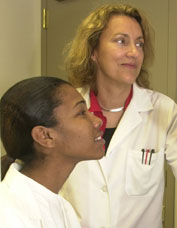


|
|
|
|
|
|
|
|
|
|
|
|
||||||||||||||
|
||||||||||||||
|
|
||||||||||||||
|
||||||||||||||
|
Posted 8/11/2008 Russ Pate says grant will enhance USC’s reputation in health sciences, attract highest caliber doctoral students. The National Institutes of Health has awarded a prestigious $1.09 million research training grant to the University of South Carolina to enhance training for doctoral students in the fields of epidemiology, exercise science and psychology. The grant, intended to encourage collaborative research across disciplines, will create the Behavioral-Biomedical Interface Program (BBIP). The training program will include additional courses, expanded course content and new research on health problems in children and adults. Funding for the grant was through the National Institute of General Medical Sciences, under the auspices of NIH’s T32 program. It is the university’s first such research training grant.
Psychology professors Dr. Rose Booze and Dr. Ron Prinz will co-direct the research training program. Booze said the science community favors an interdisciplinary training approach to understanding the complexities of biomedical and health issues over more traditional training approaches that isolate students in rigidly defined, singular disciplines. She said the university’s BBIP is an example of how the NIH is working to change that. "It is an exciting time to be a scientist, and our innovative approach to training students in the health sciences at the University of South Carolina reflects that," said Booze, interim vice president for research. "Cutting-edge science demands that students be trained to collaborate and conduct research that is grounded in multiple health disciplines. The university is meeting that challenge as a leader in innovative training programs." The BBIP will focus on behavioral genetics, endocrinology and neurobiology and neuroscience. Specifically, doctoral students will learn how to conduct research on a range of health topics, including preventing childhood obesity, managing pain for sickle-cell disease in children, promoting physical activity and healthy eating in adults and understanding the biological and social-environmental factors affecting attention deficit hyperactivity disorder (ADHD) in children and adolescents. "The uniting theme across all of the departments and research training is an emphasis on prevention science and developmental sciences broadly defined," said Prinz, who directs the university’s Research Consortium on Children and Families and is the grant’s principal investigator. Dr. Russ Pate, vice provost for health sciences, said the NIH research training grant will further enhance the university’s reputation in health sciences and the university’s ability to attract the highest caliber doctoral students. "The receipt of this prestigious award from NIH is a great credit to the participating faculty members and academic units," said Pate. "This grant will enable us to attract outstanding doctoral students who will be exposed to an innovative, state-of-the-art academic program. It is tangible evidence of the University of South Carolina’s rapidly developing maturity as a research university." Prinz said the NIH T32 grant was the result of collaboration across the university. "Landing this grant was a team effort involving staff, administrators and 30 faculty from three colleges and the Research Consortium on Children and Families, two years of work and a 400-page application," said Prinz. |
| Columbia, SC 29208 • 803-777-7000 • sphweb@gwm.sc.edu | © University of South Carolina Board of Trustees |
